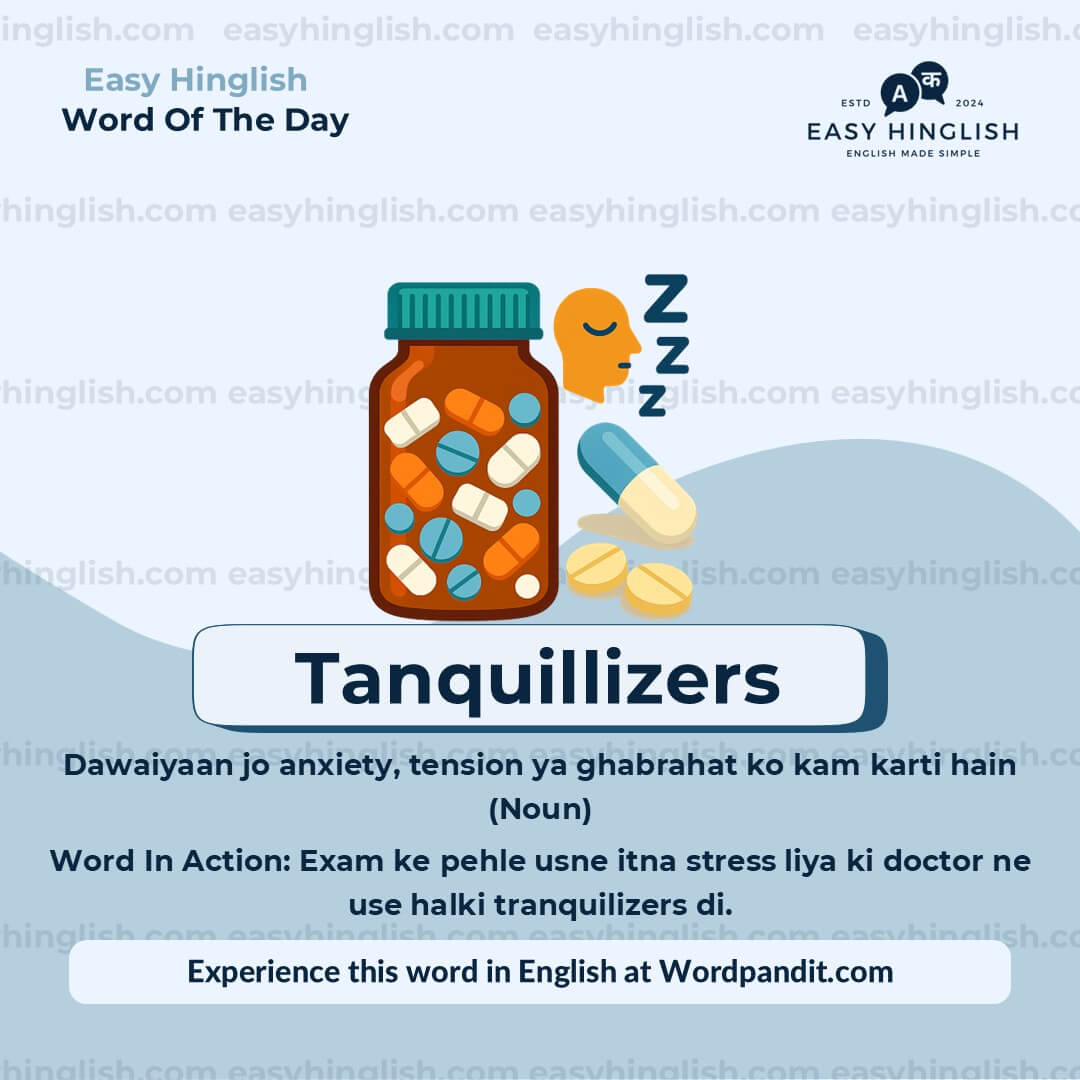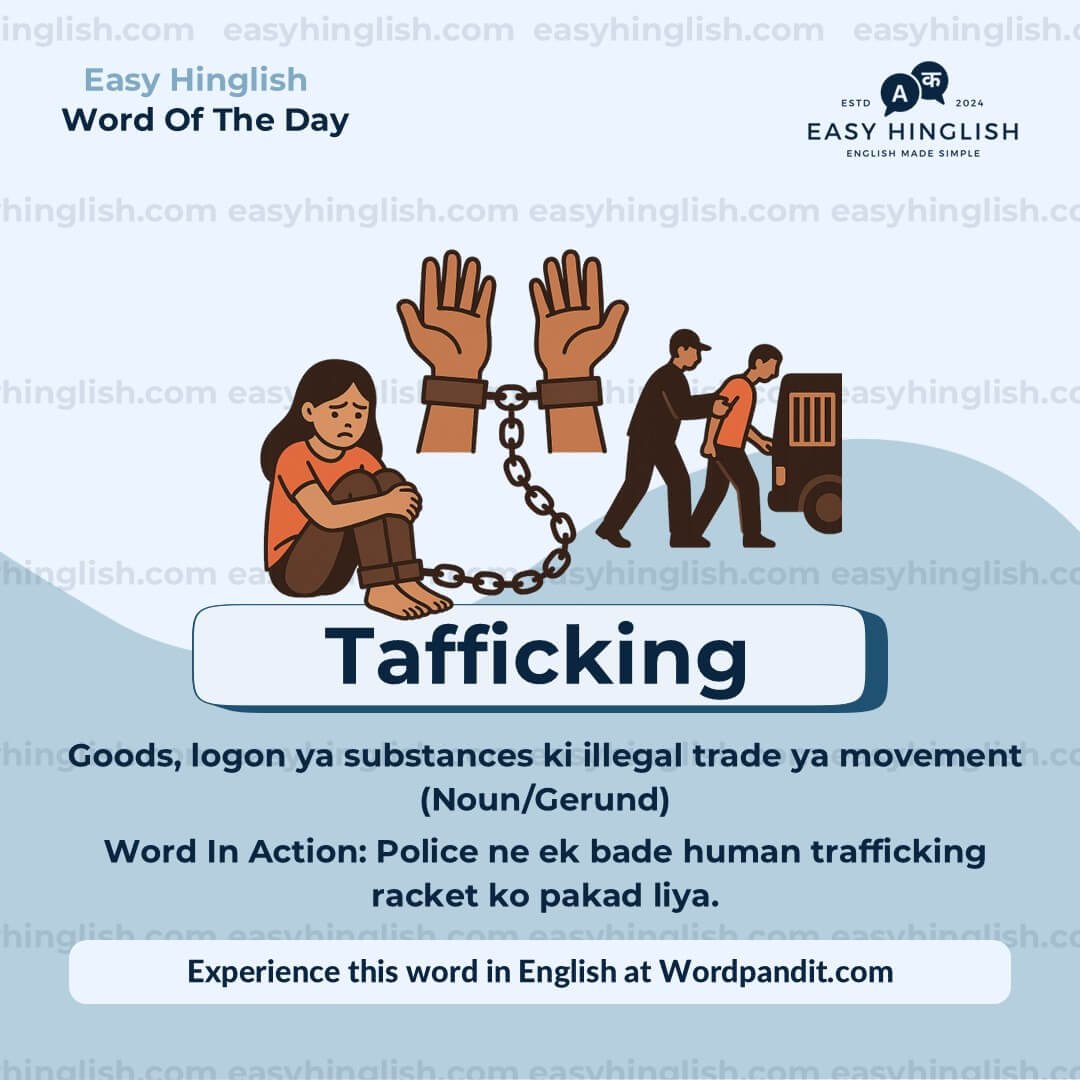Daily Vocabulary International Newspapers aur Publications se Seekho
Wordpandit ke Global Vocabulary Hub ke Saath Apni Vocabulary Expand Karo
Wordpandit par, hum aapko ek truly global vocabulary develop karne me madad karte hain, jo duniya ke sabse respected international publications se li gayi hoti hai. Yeh section aapko naye words se introduce karne ke liye design kiya gaya hai jo global conversations aur trends ko define karte hain.
Global Sources ka Power
Aapko globally sochne aur communicate karne me madad dene ke liye, hum vocabulary curate karte hain world ke top international sources se, jaise:
- The New York Times
- The Washington Post
- BBC
- The Guardian
- The Economist
- Scientific American
- Psychology Today
- Aur bhi bahut saare...
Globally Socho, Competitively Seekho
Hamare daily updates se aap international publications ke naye words seekhoge jo global news aur developments se jude hote hain. Isse aapki vocabulary current bhi rahegi aur globally relevant bhi.
Apni Global Soch Ko Expand Karo
Agar aap international exams ki tayari kar rahe ho, global business communication me excel karna chahte ho, ya sirf apni language skills improve karna chahte ho, toh Wordpandit aapko global level pe grow karne ke liye best resources provide karta hai.
Smart Learning, Global Reach
Hamari learning methodology me global examples, memory aids, aur interactive activities shamil hain, jo naye words ko effectively yaad karne aur real-world me use karne me madad karti hain.
Aaj Hi Apni Global Vocabulary Journey Shuru Karo!
Wordpandit Kyun Choose Karein?
Practical Learning: Aise words seekho jo real-world reading aur communication me aapko sach me kaam aayenge, taaki aapki comprehension aur bolne ki skills improve ho.
Diverse Content: Current affairs se lekar scientific breakthroughs tak, hamare different sources aapko multiple domains ki vocabulary seekhne ka moka dete hain.
Effortless Integration: Wordpandit ko apni daily routine ka part banao. Sirf kuch minute har din dene se aapki vocabulary time ke saath kaafi improve ho sakti hai.
Vocabulary Mastery Tak Ka Aapka Safar
- Regularly hamare Daily Vocabulary section ko visit karo
- Naye words explore karo aur unka context me use samjho
- In words ko apni writing aur bolne ki practice me use karne ki koshish karo
- Jaise-jaise aapke words badhte hain, apni progress ko track karo
Aaj Hi Apni Vocabulary Journey Shuru Karo!
Wordpandit ke saath vocabulary improve karna start karo. Roz thoda effort dalne se aap ek strong vocabulary develop kar sakte ho jo academic, professional, aur personal life me kaafi kaam aayegi.
Yaad rakho, ek naya shabd roz seekhna linguistic limitations ko door karne ka best tareeka hai! Wordpandit ko apni daily learning journey ka sathi banao aur vocabulary excellence ki taraf badho!
WORD-1: Tranquilizers
Context:
"She was taking tranquilisers to cope with her life working for Epstein." - BBC
Explanatory Paragraph:
Tranquilizers meaning in English is 'medications that reduce anxiety, tension, or agitation by calming the nervous system.' This word is used when referring to prescription drugs that help manage stress, panic disorders, or severe emotional distress. How to use tranquilizers correctly involves understanding that these are medical substances, commonly mentioned in news reports about mental health, medical cases, and in passages for competitive exams like CAT, GRE, and UPSC that discuss healthcare or psychological wellbeing.
Meaning: Drugs that reduce anxiety, tension, or agitation (Noun)
Pronunciation: TRAN-kwuh-ly-zerz
Difficulty Level: ⭐⭐ Basic to Intermediate
Etymology: Tranquilizers comes from the Latin word 'tranquillus' meaning 'calm or quiet,' combined with the suffix '-izer' indicating an agent that causes an action. The term became widely used in the 1950s when pharmaceutical companies developed medications specifically designed to calm the mind and reduce anxiety, revolutionizing mental health treatment.
Prashant Sir's Notes:
Many students confuse tranquilizers with sedatives—while both calm the body, the difference between tranquilizers and sedatives is that tranquilizers specifically target anxiety without necessarily causing sleep, whereas sedatives primarily induce drowsiness. For UPSC and GRE aspirants, tranquilizers frequently appears in passages about healthcare policy, pharmaceutical regulation, or psychological case studies. In Indian newspapers like The Hindu or Indian Express, you'll often see tranquilizers usage in sentences about prescription drug abuse, mental health awareness campaigns, or court cases involving medication. Understanding this word helps you grasp nuanced discussions about mental healthcare in reading comprehension passages.
Synonyms & Antonyms:
Synonyms: sedatives, calming agents, anti-anxiety medications, anxiolytics, depressants, relaxants, nerve pills, mood stabilizers
Antonyms: stimulants, energizers, amphetamines, excitants, agitators
Usage Examples:
- The Mumbai hospital strictly monitors the prescription of tranquilizers to prevent addiction and misuse among patients.
- Priya's doctor prescribed mild tranquilizers to help her manage the anxiety she experienced before her CAT exam.
- The investigative report revealed that many corporate employees in Bengaluru were becoming dependent on tranquilizers due to workplace stress.
- After the traumatic accident on the Delhi highway, rescue workers administered tranquilizers to calm the severely distressed survivors.
Cultural Reference:
"In high-pressure work environments, people sometimes turn to tranquilizers rather than addressing the root cause of their stress." - Common observation in workplace mental health discussions
Think About It:
Why is there still stigma around using tranquilizers for mental health in India, even though we readily accept medications for physical ailments?
Quick Activity:
Find two recent news articles in Indian newspapers that mention tranquilizers and note the context—are they discussing medical treatment, drug abuse, or legal cases?
Memory Tip:
Think of 'Tranquilizers' as 'TRANQUIL-izers'—they make you TRANQUIL (peaceful and calm). Imagine a disturbed lake becoming completely still and tranquil after you drop a calming pill into it—that's what tranquilizers do to your nervous system.
Real-World Application:
Tranquilizers is commonly used in medical journalism, healthcare policy documents, and legal reports discussing prescription drug regulation. In competitive exam passages for UPSC or GRE, this word appears in contexts involving mental health systems, pharmaceutical ethics, or case studies about stress management. Understanding tranquilizers for CAT preparation is particularly useful when analyzing passages about corporate wellness programs or healthcare infrastructure in India.
WORD-2: Birthright
Context:
"As if he believed having sex with me was his birthright." - BBC
Explanatory Paragraph:
Birthright meaning in English is 'a particular right, privilege, or possession that a person is entitled to by birth.' This word is used when describing something someone believes they automatically deserve simply because of who they are, their family status, or their position in society. How to use birthright effectively involves understanding that it often carries implications of entitlement or inheritance, and appears frequently in formal writing, legal contexts, historical passages, and competitive exam questions for CAT, GRE, and UPSC related to rights, privileges, and social hierarchies.
Meaning: A right or privilege that one inherently possesses from birth (Noun)
Pronunciation: BURTH-ryte
Difficulty Level: ⭐⭐⭐ Intermediate
Etymology: Birthright comes from Middle English, combining 'birth' with 'right,' literally meaning a right acquired at birth. The term has biblical origins, most famously from the story of Esau selling his birthright to his brother Jacob. Historically, it referred to the special privileges of the firstborn son in inheritance laws, but evolved to describe any privilege or entitlement someone claims based on their birth circumstances, social position, or identity.
Prashant Sir's Notes:
Many students confuse birthright with inheritance—while related, the difference between birthright and inheritance is that birthright refers to intangible rights and entitlements one claims by birth, whereas inheritance specifically means property or assets passed down. For CAT and UPSC aspirants, birthright frequently appears in RC passages discussing social justice, gender equality, caste systems, and constitutional rights. Birthright usage in Indian English often appears in contexts like "education is every child's birthright" or in discussions about reservation policies and fundamental rights guaranteed by the Indian Constitution. When you see this word in exam passages, it usually signals discussions about equality, privilege, or social hierarchies.
Synonyms & Antonyms:
Synonyms: entitlement, inheritance, heritage, right, privilege, prerogative, due, patrimony, legacy, natural right
Antonyms: acquired right, earned privilege, forfeiture, disadvantage, deprivation
Usage Examples:
- The eldest son of the industrialist assumed control of the company was his birthright, ignoring his younger siblings' qualifications.
- Education and healthcare should be viewed as every Indian citizen's birthright, not privileges available only to the wealthy.
- Rohan's sense of birthright made him arrogant at work, as he believed his family connections entitled him to special treatment.
- The activist argued that access to clean water and sanitation is a fundamental birthright that the government must guarantee to all communities.
Cultural Reference:
"Freedom is my birthright, and I shall have it!" - Bal Gangadhar Tilak's famous declaration during India's independence movement, emphasizing the inherent right to self-governance.
Think About It:
In modern India, which rights should truly be considered birthrights regardless of caste, religion, gender, or economic status, and how well are we protecting them?
Quick Activity:
Write two sentences: one describing something that should be a birthright in a just society, and another describing a situation where someone wrongly claimed something as their birthright.
Memory Tip:
Remember 'Birthright' by breaking it into 'BIRTH + RIGHT'—imagine a baby being born with a certificate in their hand listing all their rights. Just as Indian citizens receive fundamental rights from the Constitution at birth, a birthright is something you're entitled to simply by being born.
Real-World Application:
Birthright is commonly used in legal documents, constitutional discussions, social commentary, and editorial pieces about equality and justice. In competitive exam passages for GRE and UPSC, this word appears in contexts involving human rights, gender discrimination, caste privilege, or historical inheritance systems. For CAT preparation, understanding birthright helps you analyze passages about social hierarchies, family businesses, corporate succession, and debates about meritocracy versus inherited privilege in Indian society.
WORD-3: Glee
Context:
"He took a certain glee in making people watch." - BBC
Explanatory Paragraph:
Glee meaning in English is 'a feeling of great delight or joy, often with a sense of triumph or malicious pleasure.' This word is used when describing someone's visible happiness or satisfaction, particularly when they take pleasure in something others might find uncomfortable. How to use glee correctly involves understanding that it can describe both innocent joy and darker satisfaction at someone else's discomfort. Glee commonly appears in literature, news articles describing reactions, and competitive exam passages for CAT, GRE, and UPSC that explore human emotions and motivations.
Meaning: Great delight or joy, sometimes with malicious satisfaction (Noun)
Pronunciation: GLEE
Difficulty Level: ⭐⭐ Basic to Intermediate
Etymology: Glee comes from Old English 'glēo' meaning 'entertainment, music, or fun.' Originally, it referred to musical entertainment and mirth in medieval times, and was particularly associated with songs performed by glee clubs. Over centuries, the meaning narrowed to focus on the emotion of joy itself, sometimes carrying a hint of schadenfreude—taking pleasure in others' misfortune—when used in certain contexts.
Prashant Sir's Notes:
Students often ask: what is the difference between glee and happiness? While both describe positive emotions, glee specifically suggests visible, often exuberant joy with an element of triumph or mischief, whereas happiness is a more general contentment. For GRE and CAT aspirants, glee frequently appears in passages describing characters' reactions, particularly when authors want to show someone taking inappropriate pleasure in a situation. Glee usage in Indian English newspapers often appears in political commentary—"the opposition took glee in the government's embarrassment"—indicating schadenfreude. In exam RC passages, when you encounter glee, pay attention to whether it's innocent joy or has darker undertones, as this often reveals the author's attitude toward the character.
Synonyms & Antonyms:
Synonyms: delight, joy, elation, exuberance, jubilation, merriment, mirth, triumph, relish, schadenfreude (when malicious)
Antonyms: sadness, sorrow, misery, gloom, melancholy, dejection, despair
Usage Examples:
- The children squealed with glee when their teacher announced an unexpected holiday due to heavy rains in Mumbai.
- Rahul's political rivals watched with barely concealed glee as his corruption scandal unfolded in the national media.
- The cricket commentators couldn't hide their glee when India scored the winning runs in the final over against Pakistan.
- Priya rubbed her hands together in glee after successfully completing the difficult CAT mock test with a 99 percentile score.
Cultural Reference:
"Watching a rival team lose brings out the glee in even the most composed cricket fan." - Common sentiment during India-Pakistan cricket matches, where partisan joy is openly displayed
Think About It:
Why do humans sometimes experience glee at others' failures or misfortunes, and is this emotion ever justified or always morally problematic?
Quick Activity:
Write two sentences using glee—one showing innocent joy (like children playing) and another showing darker satisfaction (like someone enjoying a rival's failure).
Memory Tip:
Remember 'Glee' by thinking of someone saying "Wheeeee!" with GLEE while sliding down a playground slide—the sound "GLEE" itself sounds happy and excited. Or picture a Bollywood villain rubbing his hands together with glee while watching his evil plan succeed.
Real-World Application:
Glee is commonly used in literary analysis, psychological descriptions, news commentary, and character studies in novels. In competitive exam passages for CAT and GRE, this word appears when authors describe emotional reactions, particularly to reveal character traits or moral judgments. For UPSC aspirants, understanding glee for exam preparation helps in analyzing political commentary, editorial pieces about rivalries, and passages exploring human emotions and ethical behavior in literature and social situations.
WORD-4: Trafficking
Context:
"Ghislaine Maxwell was jailed on charges related to sex trafficking." - BBC
Explanatory Paragraph:
Trafficking meaning in English is 'the illegal trade and transportation of goods, people, or substances, especially involving exploitation or criminal activity.' This word is used when referring to serious crimes involving the movement and sale of prohibited items or the exploitation of human beings. How to use trafficking correctly requires understanding that it always implies illegal activity—whether drug trafficking, human trafficking, or wildlife trafficking. Trafficking commonly appears in news reports about crime, legal documents, and competitive exam passages for CAT, GRE, and UPSC related to law enforcement, social issues, and international crime.
Meaning: The illegal trade or movement of goods, people, or substances (Noun/Gerund)
Pronunciation: TRAF-ik-ing
Difficulty Level: ⭐⭐⭐ Intermediate
Etymology: Trafficking comes from the word 'traffic,' which originated from Middle French 'trafique' meaning 'trade or commerce.' While 'traffic' initially referred to legitimate trade, by the 16th century it began to acquire negative connotations of illicit commerce. The '-ing' form 'trafficking' specifically emphasizes the ongoing criminal activity of trading in prohibited goods or exploiting people, becoming widely used in legal and journalistic contexts from the 20th century onward, especially concerning drugs and human exploitation.
Prashant Sir's Notes:
Many students confuse trafficking with smuggling—while both are illegal, the difference between trafficking and smuggling is crucial: trafficking specifically involves exploitation and coercion of people or ongoing criminal trade networks, whereas smuggling simply means illegally transporting goods across borders. For UPSC aspirants, trafficking frequently appears in passages about women's rights, child protection, border security, and international crime. In Indian newspapers like The Hindu, you'll see trafficking usage in sentences about "human trafficking rackets busted in Bihar" or "drug trafficking along the Indo-Myanmar border." Understanding trafficking for CAT and GRE preparation is essential because it appears in serious social issue passages where authors discuss exploitation, victimization, and law enforcement challenges.
Synonyms & Antonyms:
Synonyms: illegal trade, smuggling (with nuances), illicit commerce, contraband movement, exploitation trade, black market dealing, racketeering
Antonyms: legitimate trade, legal commerce, authorized transport, lawful business, ethical exchange
Usage Examples:
- The Delhi police uncovered a major human trafficking network that was forcing young girls from rural Bihar into domestic servitude.
- Drug trafficking across the India-Pakistan border has become a serious concern for national security agencies in recent years.
- NGOs working in Mumbai's red-light districts focus on rescuing victims of sex trafficking and providing them rehabilitation services.
- The government launched a comprehensive campaign against wildlife trafficking to protect endangered species like tigers and elephants from poachers.
Cultural Reference:
"Trafficking in persons is modern-day slavery, stripping victims of dignity and freedom." - Common refrain in anti-trafficking awareness campaigns across India emphasizing the gravity of this crime
Think About It:
Why does human trafficking continue to thrive in India despite strict laws, and what societal factors make certain communities more vulnerable to traffickers?
Quick Activity:
Search for two recent news articles about trafficking cases in India and identify the type of trafficking discussed—human, drug, wildlife, or organ trafficking.
Memory Tip:
Remember 'Trafficking' by thinking of 'TRAFFIC + KING'—imagine a criminal king controlling illegal traffic (movement) of goods or people. Or break it as 'TRAP-FICKING'—traffickers TRAP people and goods in illegal trade, 'ficking' (taking) away their freedom.
Real-World Application:
Trafficking is commonly used in crime journalism, legal documents, international law discussions, and social justice reports. In competitive exam passages for UPSC and GRE, this word appears in contexts involving human rights violations, organized crime, border security, and social welfare policies. For CAT preparation, understanding trafficking helps you analyze passages about law enforcement challenges, ethical business practices, and social problems, particularly when questions test your ability to grasp the severity and implications of criminal exploitation in modern society.
WORD-5: Categorically
Context:
"I can absolutely categorically tell you it never happened..." - BBC
Explanatory Paragraph:
Categorically meaning in English is 'in a way that is absolute, unambiguous, and without any exceptions or conditions.' This word is used when someone wants to make an emphatic, definitive statement that leaves no room for doubt or interpretation. How to use categorically effectively involves understanding that it strengthens denials, confirmations, or declarations by removing all possibility of qualification. Categorically commonly appears in legal statements, formal denials, political speeches, and competitive exam passages for CAT, GRE, and UPSC where absolute certainty needs to be expressed.
Meaning: In an absolute, unconditional, and unambiguous manner (Adverb)
Pronunciation: kat-uh-GOR-ik-lee
Difficulty Level: ⭐⭐⭐ Intermediate
Etymology: Categorically comes from the Greek word 'kategorikos,' meaning 'accusatory or affirmative,' derived from 'kategoria' (category or statement). Through Latin 'categoricus,' it entered English in the late 16th century. Originally used in philosophical and logical contexts to describe statements that were absolute rather than conditional, it evolved to mean 'without exception or qualification.' The word emphasizes complete certainty, making it particularly powerful in legal, political, and formal communication where unambiguous positions must be established.
Prashant Sir's Notes:
Students often ask: what is the difference between categorically and absolutely? While both emphasize certainty, categorically usage specifically means 'without any exceptions or conditions across all categories,' whereas absolutely simply means 'completely.' For CAT and GRE aspirants, categorically frequently appears in RC passages involving legal testimony, political denials, or scientific claims where the author wants to show someone making an unequivocal statement. In Indian English newspapers, you'll see phrases like "the minister categorically denied the allegations" or "the court categorically rejected the petition"—that word choice signals zero ambiguity. When preparing for UPSC, note that categorically often appears before words like 'denied,' 'rejected,' 'stated,' or 'refused,' creating emphatic declarations that brook no argument.
Synonyms & Antonyms:
Synonyms: absolutely, unequivocally, unconditionally, definitely, unambiguously, flatly, emphatically, utterly, completely, explicitly
Antonyms: conditionally, tentatively, ambiguously, partially, possibly, uncertainly, vaguely
Usage Examples:
- The accused politician categorically denied accepting any bribes during the press conference at the Delhi Press Club.
- Professor Sharma categorically stated that without completing the prerequisites, students would not be admitted to the advanced course.
- The Supreme Court categorically ruled that the practice violated fundamental rights guaranteed under the Indian Constitution.
- When asked about his involvement in the scam, Rajesh categorically refused to answer any questions without his lawyer present.
Cultural Reference:
"India categorically rejects any interference in its internal matters." - Standard diplomatic language used by the Ministry of External Affairs when responding to international criticism, emphasizing absolute rejection
Think About It:
Why do politicians and public figures use the word 'categorically' so frequently in their denials, and does its use actually make their statements more believable?
Quick Activity:
Write two sentences using categorically—one where someone categorically denies an accusation, and another where someone categorically confirms a fact or policy.
Memory Tip:
Remember 'Categorically' by breaking it into 'CATEGORY + ICALLY'—imagine someone checking off every single category on a list and saying "No exceptions in ANY category!" When you deny something categorically, you're denying it across ALL categories, leaving zero room for doubt. Think of a cricket umpire categorically declaring "NOT OUT!"—it's final and absolute.
Real-World Application:
Categorically is commonly used in legal proceedings, political statements, official denials, corporate communications, and diplomatic language. In competitive exam passages for CAT and GRE, this word appears when authors describe strong, unambiguous positions taken by individuals or institutions. For UPSC preparation, understanding categorically helps you analyze passages involving government policy statements, court judgments, and international relations where absolute positions are critical. The word signals to readers that no middle ground or qualification exists in the statement being made.













